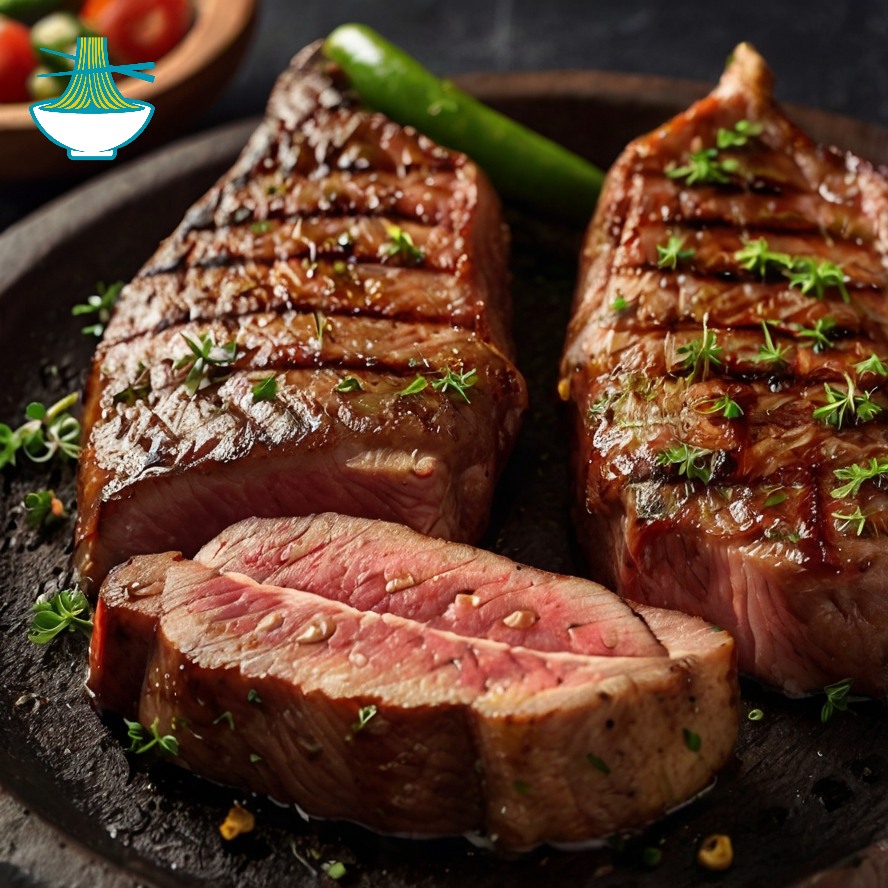Picanha is a celebrated Brazilian cut of beef known for its rich flavor and tender texture. This recipe highlights the traditional grilling technique that makes picanha a star at Brazilian barbecues, or churrascos. Characterized by its distinctive fat cap, picanha is seasoned simply with coarse salt to enhance its natural flavors and achieve a crispy, savory crust. Ideal for any barbecue enthusiast or anyone looking to experience authentic Brazilian cuisine, this dish embodies the essence of Brazil's culinary traditions.

Ingredients:
- 1 high-quality picanha cut (about 2-3 pounds)
- Coarse salt
Instructions:
1. Select the Meat: Choose a high-quality picanha cut with a generous layer of fat on top, which helps keep the meat moist and flavorful during cooking.
2. Preheat the Grill: Heat your grill to high. Alternatively, you can use a cast-iron skillet or broiler if a grill is unavailable.
3. Season the Picanha: Generously season the picanha with coarse salt, rubbing it evenly over the meat. The salt will create a delicious crust as it cooks.
4. Grill the Picanha: Place the picanha on the grill, fat side down. Grill for 10-15 minutes until the fat is crispy and golden. This step is crucial for rendering the fat properly.
5. Cook the Meat: Flip the picanha and continue grilling for another 10-15 minutes, or until it reaches your desired doneness. For medium-rare, aim for an internal temperature of 130-135°F. Adjust the cooking time based on your preference for doneness.
6. Rest the Meat: Remove the picanha from the grill and let it rest for 5-10 minutes. This allows the juices to redistribute, resulting in a more tender and flavorful steak.
7. Slice and Serve: Slice the picanha against the grain into thin strips to enhance tenderness. Serve with traditional Brazilian sides like white rice, black beans, farofa (toasted cassava flour), and optionally, chimichurri sauce.
Enjoy your authentic Brazilian picanha, perfect for sharing with family and friends at a churrasco or any special occasion!
Nutrition Value:
1. High-quality picanha cut (about 2-3 pounds)
- Calories: Approximately 250-300 calories per 3-ounce serving. Picanha is high in calories due to its fat content, which provides energy.
- Carbohydrates: 0 grams. Picanha contains no carbohydrates, making it a good choice for low-carb diets.
- Protein: Approximately 20-25 grams per 3-ounce serving. Picanha is rich in protein, essential for muscle repair and growth.
- Fat: About 20-25 grams per 3-ounce serving. The high fat content contributes to its rich flavor and juiciness. It provides energy and supports cell function.
- Sodium: Varies by preparation, but picanha itself has minimal sodium. The sodium content will increase if additional salt is used during cooking.
- Cholesterol: Roughly 70-80 milligrams per 3-ounce serving. Cholesterol is essential for hormone production but should be consumed in moderation.
- Vitamins: Contains small amounts of B vitamins, including B12, which is important for nerve function and red blood cell production.
- Minerals: Provides essential minerals like iron, which supports oxygen transport in the blood, and zinc, which is vital for immune function.
- Nutritional Benefit: Picanha is a high-protein, nutrient-dense meat that provides essential amino acids, vitamins, and minerals, making it a valuable part of a balanced diet.
2. Coarse salt
- Calories: 0 calories. Salt contains no calories, so it does not contribute to your energy intake.
- Carbohydrates: 0 grams. Salt does not contain carbohydrates.
- Protein: 0 grams. Salt does not contain protein.
- Fat: 0 grams. Salt is free from fat.
- Sodium: Approximately 2,300 milligrams per teaspoon. Coarse salt is high in sodium, which is essential for maintaining fluid balance but should be used in moderation to avoid health issues like high blood pressure.
- Cholesterol: 0 milligrams. Salt does not contain cholesterol.
- Vitamins: 0 milligrams. Salt does not provide vitamins.
- Minerals: Mainly sodium chloride. While salt contains sodium, it does not provide other significant minerals.
- Nutritional Benefit: Salt is essential for maintaining electrolyte balance and proper fluid regulation in the body. However, excessive intake can lead to health problems, so it should be used sparingly.


Comments